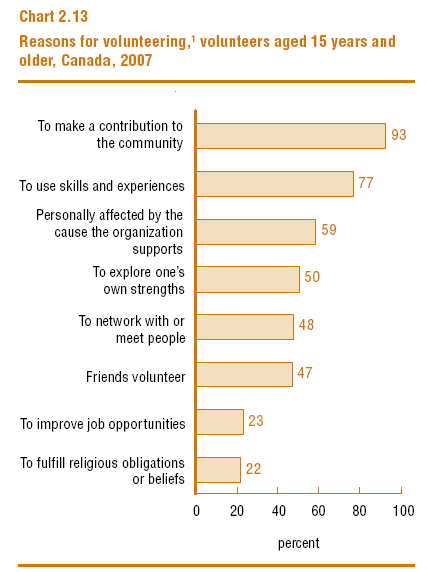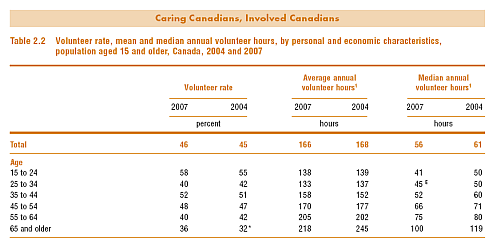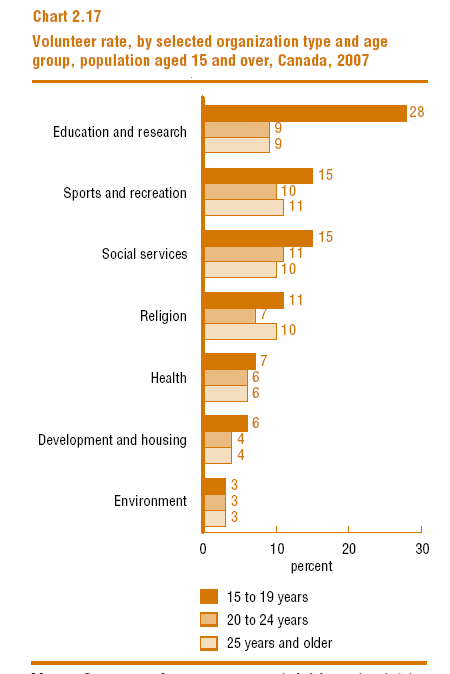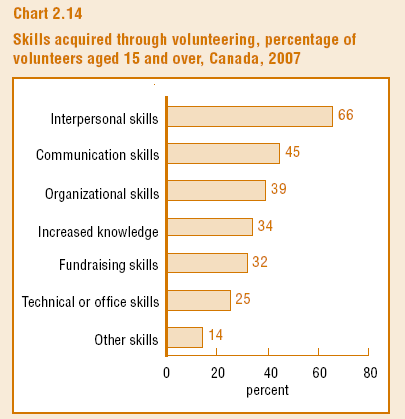- Midtown Toronto Executive Network Forum
- Seniors' Health Care Seminar
- Calendar
- Contact
- Mission Statement
- History
- Newsletter
- POINT Updates from the Chair...
- FREE INCOME TAX CLINICS
- Low-Income Energy Assistance Program (LEAP)
- Rent Bank Access Centre
- Community Resources
- Canadian Citizenship
- Housing Web Page
- Seniors' apartments
- Job Bank
- Housing help
- Hostels for homeless people
- Tenant Rights
- Student Volunteer Resource Guide
- Student Volunteer Guide Feedback Form
- United Way
- Complaints
Statistics on Youth Volunteers
August 5, 2010 - 2:02pm — admin
Source: Government of Canada
Website: https://www.ic.gc.ca/eic/site/064.nsf/eng/05709.html




Source: Statistic Canada, Canada Survey of Giving, Volunteering and Participating, 2007 Figure 2.17, .14
Website: http://www.statcan.gc.ca
The Motivation
Due to the federal government's decision to conduct short-form censuses, rather than previously mandated long-form censuses, the following are the most recent statistics available.
Source: Government of Canada
Website: https://www.ic.gc.ca/eic/site/064.nsf/eng/05709.html
Most (93%) agreed that the desire to make a contribution to their community was an important reason for their volunteering (Chart 2.13).19 Other frequently reported reasons were the desire to make use of personal skills and experiences (77%) and having been personally affected by the cause that the organization supports (59%). Around half of all volunteers reported that they volunteered to explore their own strengths (50%), to network or meet people (48%) and because their friends volunteered (47%). Improving job opportunities (23%) and fulfilling religious obligations or beliefs (22%) were less frequently cited as reasons.

There are many impressive facts concerning youth volunteers.
How Many?
According to the 2007 survey on giving, volunteering and participating, youth had the highest rate of volunteering. The percentage of Canadians who volunteer generally decreases with age. Over half (58%) of all young people aged 15 to 24 volunteered through a group or organization, compared to one-third (36%) of seniors aged 65 and older.

Differences by Age
Those aged 15 to 19 were much more likely to volunteer than were 20 to 24 year olds (65% vs. 47%). However, 20 to 24 year olds volunteered more hours on average (182 vs. 116).
Turning to the types of organizations to which young Canadians contribute their time, 15 to 19 year olds were more likely than either 20 to 24 year olds or those over 25 to volunteer for almost all of types of organizations (Chart 2.17). They were much more likely to volunteer for education and research organizations and sports and recreation organizations and somewhat more likely to volunteer for social services organizations.

The Benefits of Volunteering
One of the benefits of volunteering is the opportunity it provides volunteers to learn new skills. Two thirds (66%) of volunteers reported that their volunteering had provided them with interpersonal skills, such as understanding and motivating people or being better able to handle difficult situations (Chart 2.14). Almost half (45%) indicated that they acquired communication skills, 39% obtained organizational or managerial skills, and 34% reported increased knowledge about specific subjects like health, women's or political issues, criminal justice, or the environment. About a third (32%) acquired fundraising skills and 25% obtained technical or office skills (e.g., first aid, coaching, computer skills, and bookkeeping). Youth also tend to be motivated to volunteer by different factors than other volunteers.

Source: Statistic Canada, Canada Survey of Giving, Volunteering and Participating, 2007 Figure 2.17, .14
Website: http://www.statcan.gc.ca














Comments
Post new comment